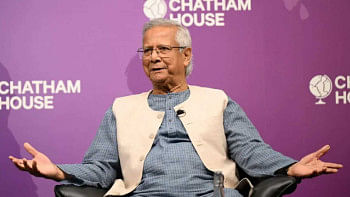‘Increase in govt schemes is not the solution for lack of variations in savings schemes’

In conversation with Zahid Hussain, former Lead Economist, Macroeconomics, Trade & Investment Global Practice, World Bank, Dhaka Office.
Why is an adequate rate of national savings essential to achieving higher investment and consequently higher economic growth? How do you evaluate the status of savings in Bangladesh?
In the globalised world, national savings are arguably not the only source of investment. Even if national savings are low, we can always borrow from international financial markets for investments. So, we can say that foreign savings can substitute national savings for investment purposes. However, this is true in theory. Practically, it is not easy to access the foreign capital market for a country like Bangladesh.
Bangladesh is an emerging economy. It still does not have the credit ratings that are good enough to issue bonds or other financial instruments for raising money from abroad. This is the case for both the private and public sectors in the country.
Savings rate in Bangladesh is not that bad in comparison to neighbouring countries like India, Pakistan and even Vietnam. We are in the 30 percent range. I don’t see savings as a binding constraint for investment. I believe other than savings rate, the growth of investment is highly influenced by the investment climate in the economy. One of the key factors that needs to be considered for the investment climate is the level of risk associated with the investments.
We have good savings rate because the national savings rate depends largely on the demographic structure of a country. In case of Bangladesh, the age structure is very favourable for boosting savings rate. There are a very large number of people who are in their 30s, already in the labour force. And a huge number of younger people will continue to join the labour force in the near- and medium-term. Given that our dependency ratio is decreasing, the proportion of people in the savings age group is increasing. Besides, our social system is changing, where the proportion of nuclear families is high. This increases the need for savings. As a result, the aggregate savings of the nation are increasing.

National savings comprise of three components: household savings, business savings and government savings. The savings rate in Bangladesh is satisfactory in terms of household savings for which the demographic structure is playing a supportive role. The government is also a net saver in Bangladesh contributing about 1.5-1.6 percent of GDP to national savings. However, the corporate or business savings don’t seem to be in good form. We don’t even know what proportion of the national savings is comprised of corporate savings. Research says that the key factors which differentiate savings rate between economies are the demographic structure, the income level and the financial system. In Bangladesh, the banks are an integral part of our financial system. People look up to the banks for storing their savings and creating more value for their money to meet future needs. Unfortunately, recent events in the country are making people lose faith in banks. We don’t have a proper capital market or bond market where small savers could safely store their value.
There are some major problems in our banking system. The problems include capital inadequacy, liquidity shortage and lack of proper corporate and regulatory governance. The inefficiency of the banking system is influencing people to do direct investment. But direct investment is only suitable for subsistence economies, not for modern economies. In the modern economy, for effective investment, it is important for the financial institutions like banks to channel funds from the surplus units to the deficit units to boost economic growth.
If the status of savings is not satisfactory or is inadequate to support Bangladesh’s growth vision, how can the challenges be overcome? Is the dismal state of banks affecting savings?
We don’t have a lot of variety in savings schemes. We have certain public sector operative schemes such as postal savings, national savings certificates and wage earner bonds for migrant workers, very limited insurance services besides the saving opportunities in the banking system.
It is very important to develop the financial system in Bangladesh. The equity and bond market need to develop to offer better financial instruments for enhancing savings and economic growth. I think if the national savings schemes are managed judiciously, then the people would shift more towards the deposits available in the banks. The private sectors will also get the scope to develop better instruments to mobilise financing and play a key role in national savings. I believe the way national savings scheme is currently managed is hindering the development of local debt markets. NCSs provide a yield of around 11 percent whereas government bonds of similar maturities yield between 5 and 6 percent.
Increase in government schemes is not the solution for the lack of variations in the savings schemes. For example, in case of pension funds, there is a pension scheme for the government employees. But to boost national savings, it is important to introduce pension in the private sector as well. The barrier, on this note, is the lack of deep and diversified financial markets in the country.
It is necessary that the financial market outside the banking system develops. The insurance market, stock market and bond market need to develop to enhance national savings. This will only be possible when the legal infrastructure is supportive. The most appropriate role that the government needs to play is enforcing laws that will mitigate the loopholes in the system and build trust amid both the buyers and sellers to carry out transactions in the financial market. Instead of making schemes on their own, the government should facilitate financial market development.
Do you think there should be more variety in saving schemes to cater to different sections of the population?
I would prefer a more direct reform. A good rationale is unavailable regarding the different rates on various national savings instruments. The government could have lowered the interest rate to discourage the demand for national savings securities. This would have lowered the future interest burden on the budgets. We need to reduce the distortions caused by the National Savings Scheme to boost development of capital markets. By offering risk-free fixed interest rates well above market rates, NSS instruments have virtually replaced marketable wholesale instruments since 2014. This has adversely affected the issuance of marketable government securities, rapidly increased the interest expenditure on domestic debt and negatively impacted liquidity in the private banking system. NSS interest rates should be linked with the yields of marketable instruments. This could help increase the size of the government bond issuance needed for increasing the reliability of primary and secondary market prices and support establishing a benchmark yield curve. The latter is critical for the development of corporate debt markets.
The government has a major role to play in the enhancement of the credit and legal infrastructure in several areas. The credit information system needs serious upgradation to reduce risks and augment financial institutions’ ability to expand products and services. The legal framework for registering movables and immovables is deficient and debt enforcement is very cumbersome. Also, Alternate Dispute Resolution mechanisms to collectively address financial distress are lacking. Last but not the least, pitfalls in the insolvency regime have severely limited its use.
Financial institutions and corporations in Bangladesh have begun to rely on overseas foreign currency loans for funding their investments. This makes them vulnerable to foreign exchange risks with inadequate hedging. Much of the borrowing is short-term for the financing of long-term investment. As seen during the East Asian financial crisis, when foreign capital inflows are reversed, the stability of the exchange rate is threatened, and the financial system can collapse, causing serious economic contraction and job losses. Developing local currency bond markets would enable Bangladesh to achieve sustainable, private-sector-led growth, building on the large pool of savings for domestic investment. Policymakers need to facilitate access to bond markets by expanding the number and variety of issuers as well as promote a diverse range of bonds to better channel a large pool of domestic savings into long-term investment.

 For all latest news, follow The Daily Star's Google News channel.
For all latest news, follow The Daily Star's Google News channel. 



Comments